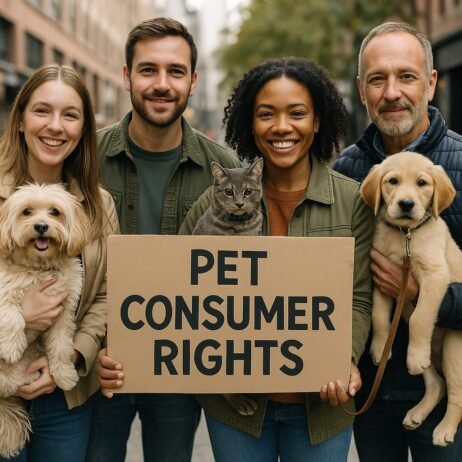Consumer rights when buying pet?
- 1 March 2024
- BuyAPet Editorial Team
- BuyAPet User Articles (Support), Pet Law
Protecting Your Paws
Consumer Rights When Buying a Pet (UK)
The journey of pet ownership is joyful—but it comes with responsibilities and legal considerations. Knowing your consumer rights helps protect you and gives your new companion the best start.
The UK Pet Market: a booming industry
With pet ownership widespread in Britain, the market includes breeders, shops and shelters. As it grows, understanding your rights becomes even more important when buying a pet.
The risks of unprotected purchases: why rights matter
- ✓ Hidden health issues that surface after purchase
- ✓ Risk of unknowingly supporting unethical breeding
- ✓ Unexpected vet costs and financial strain
Knowing your protections helps you avoid these pitfalls.
Setting the stage: what this guide covers
- How to choose an ethical breeder/seller
- Understanding contracts and your legal protections
- Health & welfare checks and what to expect
- What to do if problems arise after purchase
- How pet insurance fits into the picture
Choosing a responsible breeder or seller
Ethical breeder indicators
- ✓ Transparent about breeding practices
- ✓ Health screening with records and guarantees
- ✓ Proper socialisation and clean, safe environment
Red flags to avoid
- ✓ Refuses to show living conditions
- ✓ No documentation or health guarantees
- ✓ Pressure to decide quickly or pay a deposit
Due diligence: questions to ask
- What health checks have been performed?
- Can I see the pet’s parents?
- What guarantees do you provide regarding health?
Contracts & agreements: your legal protections
Written agreements—why they matter
Include price, breed, age, health guarantees, return policy, and any promises made by the seller.
Key UK laws (plain-English overview)
- Sale of Goods Act 1979 (legacy principles): goods should be of satisfactory quality for their description.
- Consumer Rights Act 2015: goods must be as described, fit for purpose and of satisfactory quality, with routes to repair, replacement or refund.
Always seek specific legal advice for your situation.
Health checks & guarantees
- Veterinary health check report and vaccination/microchip records
- Written health guarantee (what’s covered, how long)
- If hidden issues arise, discuss refund/partial refund, vet cost contributions or returning the pet per agreement
Owner responsibilities
- Regular vet check-ups and preventative care
- Providing a safe, caring home with proper nutrition and exercise
Dealing with problems: if things go wrong
Returning a pet
- Check the return policy in your agreement
- Document reasons and any vet findings
- Note any time limits for returns
Seeking redress
- Raise the issue with the seller in writing
- Keep records of all communications
- Escalate to Trading Standards if unresolved
When to involve Trading Standards
Seek guidance and potential investigation if you suspect illegality or the seller ignores your rights.
Pet insurance: protecting your investment
Why it matters
- Covers unexpected vet bills and emergencies
- Can support long-term care needs
Choosing a policy
- Check exclusions (e.g., pre-existing conditions)
- Compare coverage limits, excess and premiums
- Understand claims process and deadlines
Conclusion: empowered pet ownership
Research thoroughly, know your rights and responsibilities, and use the support available. Informed choices help protect you and give your new companion a healthy, happy start.
Key takeaways
- ✓ Choose responsible sellers and avoid red flags
- ✓ Get a written agreement and keep all paperwork
- ✓ Prioritise health checks and appropriate insurance
Further resources
- Citizens Advice
- RSPCA
- Your local Trading Standards office
This page is general information, not legal advice.
